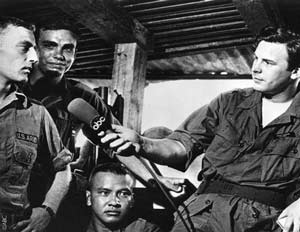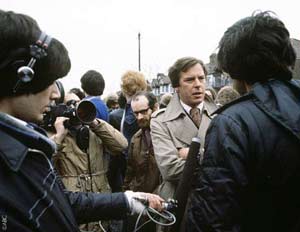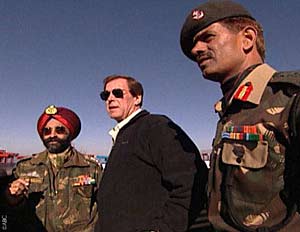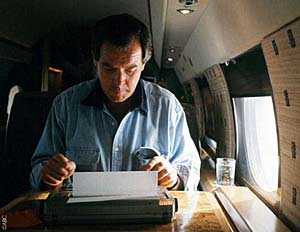 |
→ October 2005 Contents → Column
|
Peter Jennings: Thanks for the 'Fill'
|
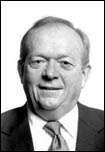 |
||||||||||||
|
Undated - We drained the last drop of Carmel cabernet. Peter Charles Jennings ordered another bottle of the Israeli red wine. "If it wasn't for this place,'' he said with a sweep of his arm, "I would have died."
The slightly boozy gesture was meant not for the dining room but the surrounding Jerusalem hotel, the American Colony. The splendor of the former pasha's home with its stunning courtyard had become headquarters for countless journalists who swarmed to cover Mideast turmoil.
Most reporters seem to have faced death on one assignment or another and Jennings' tale was hardly harrowing. A scorpion bite - I think while Jennings was in the Sinai - had been improperly treated until he arrived at the American Colony and collapsed with an infection and a fever. His misery was compounded by nightmares as he drifted in and out of sleep in a dark room with vaulted alcove ceilings and cool stone floors.
When death did finally catch up with Jennings on Aug. 7, that dinner, the wine and the story of the scorpion came back to me. For Jennings, it was a painful paragraph in a chapter of his life as a reporter. The sum of such events, big and small, in a journalist's life is the foundation of experience and wisdom.
Jennings projected that essence as the ABC News anchor when you turned to him when the unexpected left us breathless, such as the destruction of the World Trade Center and the attack on the Pentagon. He was perplexed by 9-11, scrambled for information but was terribly careful and mostly masterful for hours on end. Ten years of beat reporting in the Mideast enhanced his insights of Islam and events that are still unfolding.
In instantly synthesizing what left many agog that day, Jennings fell back on a lifetime of experience as a reporter. He had paid his dues before sitting in the anchor chair for 23 years. That gravitas was once a prime requisite for editors and network bosses who select the men and women to handle the most important news of the day. Today, however, as Jennings, Tom Brokaw and Dan Rather fade from the national conscience, I wonder about their successors and their ability to sort nuggets from clinkers and master the unexpected. The worrisome trend in the anchor game has favored appearance over a résumé with 20 years of scrambling for elusive facts.
None in the anchor chair today has the combined grasp of detail of both national and international affairs that Jennings earned the hard way. And, their supporting cast has been slashed by corporate executives who have shuttered bureaus in the United States and around the globe.
Network priorities were very different 25 years ago.
Word of the scorpion attack came while I was attending the Jennings School of Mideast maneuvering. We had first met in 1979 while covering the economic summit meeting of world leaders in Italy. Our wives were shopping in the same shoe store on the Via Veneto in Rome prior to the Venice meeting where I would be covering President Jimmy Carter. We began an exchange of information that would continue until the months before his death.
That Venice summit underlined the freewheeling network news budgets. The event and our hotels were on the Lido island, a boat ride away from the city. ABC had its own flotilla and a dispatcher at dockside. You could choose a vessel with or without a sailor who sang, "O Solo Mio." The choice broke up Jennings and Steve Bell, another ABC reporter, who likened network spending to a rocket in space. "We are at the apogee," Bell said. "We're headed back down after this."
Before becoming a foreign correspondent, I had covered Washington and the White House for 20 years. When we first met, Jennings recognized me from televised White House news conferences. I recognized him as the Hollywood-handsome personality who served as the ABC News anchor in 1965 before being exiled abroad.
My appreciation of Jennings' expertise began on Aug. 6, 1981, the day Egyptian President Anwar Sadat was assassinated. While I knew Sadat and the Mideast from a Washington perspective, it was meaningless as I stepped into the turmoil of Cairo that night. I had no clue as to the assassins. Jennings did. He told me they were likely fundamentalist Moslems who favored beards and detested western ways that Sadat had incorporated into an ancient culture.
I pursued that angle with other sources and it became the lead of my wrap-up on a series of articles that later were named as the best spot news writing by the American Society of Newspaper Editors, a coveted national journalism prize.
I was just as green when I arrived in Lebanon after the Israeli invasion in 1982. Jennings, ABC bureau chief in Beirut since 1973, was waiting for me with an itinerary and, more importantly, his driver. "Take him all around," he told the driver. "Everywhere."
To me, he wagged his finger. "When you get to the Green Line, be very careful. This is a crazy place."
I had prowled the wreckage of both the embassy and the Marine barracks. There were bits and pieces of men and women who I had known to one degree or another. I can still evoke the sights, the stench and Jennings' warning about the madness of Beirut.
For me, Cairo and Beirut were the first hints of the fundamentalist Moslem assault on established governments. But these events provided a foundation for news coverage for Jennings and myself for the next 26 years.
In the aftermath of the Sadat assassination, Egyptian police jailed a pediatrician-turned-radical: Ayman al-Zawahiri. And, for the next two decades al-Zawahiri would dominate the planning and the execution of terrorist strikes that would rattle governments in the United States, Britain, Iraq, Spain, Saudi Arabia and smaller nations. It was al-Zawahiri who was seen as the brains behind al Qaeda and Osama bin Laden. And, U.S. intelligence suspects al-Zawahiri recruited the Egyptian architect, Mohammed Atta, to organize the 9-11 attacks.
Jennings and I both knew instinctively that bin Laden and al-Zawahiri were behind the 9-11 attacks the day that it happened. "There was no doubt in my mind," Jennings told me later. Whether he said it during the 9-11 broadcast, I don't know. But bin Laden was in the lead of Newsday's story the next day, after my suspicions were confirmed by the Central Intelligence Agency.
On and off, for more than 22 years, we exchanged notes and gossip by phone or in meetings in places like Reykjavik or New Orleans. The trading of newsworthy information is a tradition based on no written guidelines. It's called a "Fill," as in, "I will fill you in." It is transacted by reporters who also share a mutual respect for each other's journalism.
Jennings was delighted at my Pulitzer Prize for International Reporting in 1992. The prize was for my work on yet another Mideast war, Desert Storm. There were winners in 19 Pulitzer categories but Jennings made sure only my name and picture wound up on the ABC evening news that night.
"I hope you are going to acknowledge me in your acceptance speech," Jennings laughed. He said it jokingly. He never made the list of all the men and women who helped me to uncover the grisly details of the first Iraq war that had been skillfully hidden by then-Defense Secretary Dick Cheney and President George W. Bush.
And, other experienced reporters also helped me over my first hurdles in the Mideast. Yet the insights, the prejudices and advice of Jennings were early and instrumental in making me more surefooted in Arab capitals.
So, Peter, thanks for the Fill.
© Patrick J. Sloyan
|
|||||||||||||
Back to October 2005 Contents
|
|
